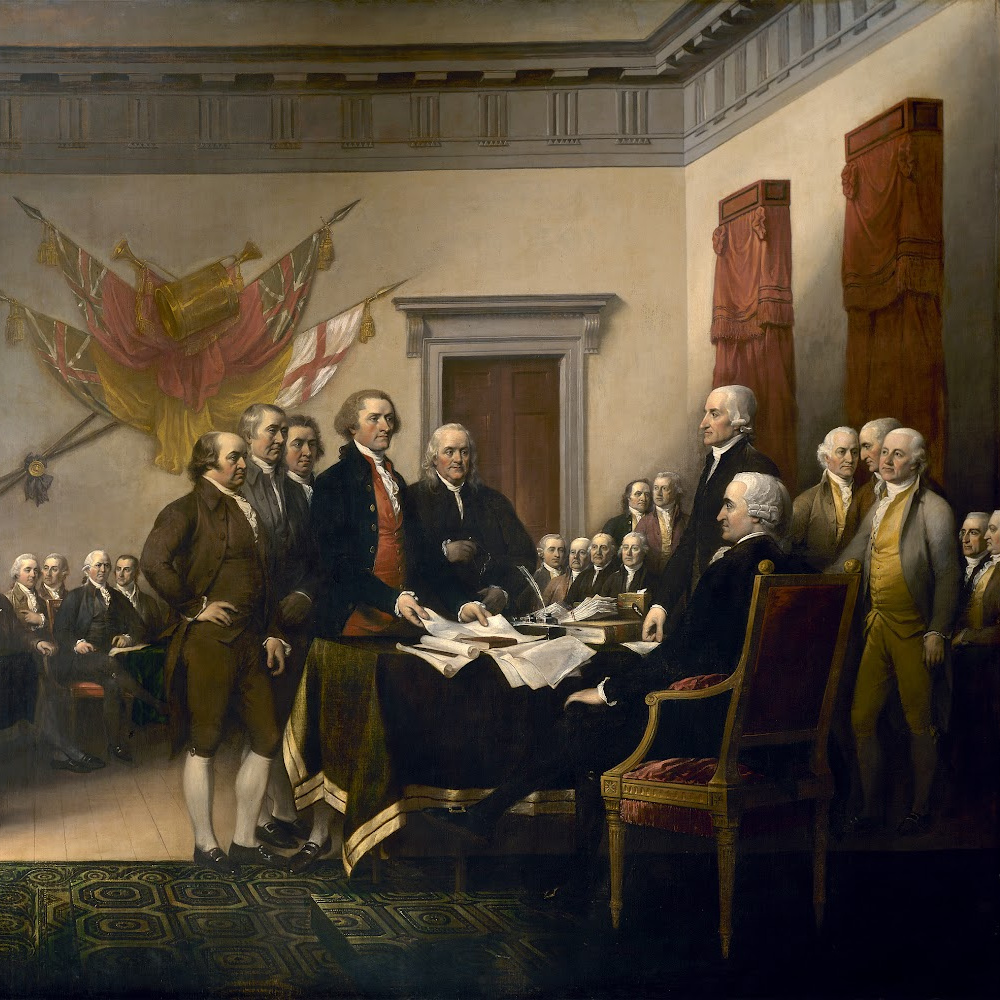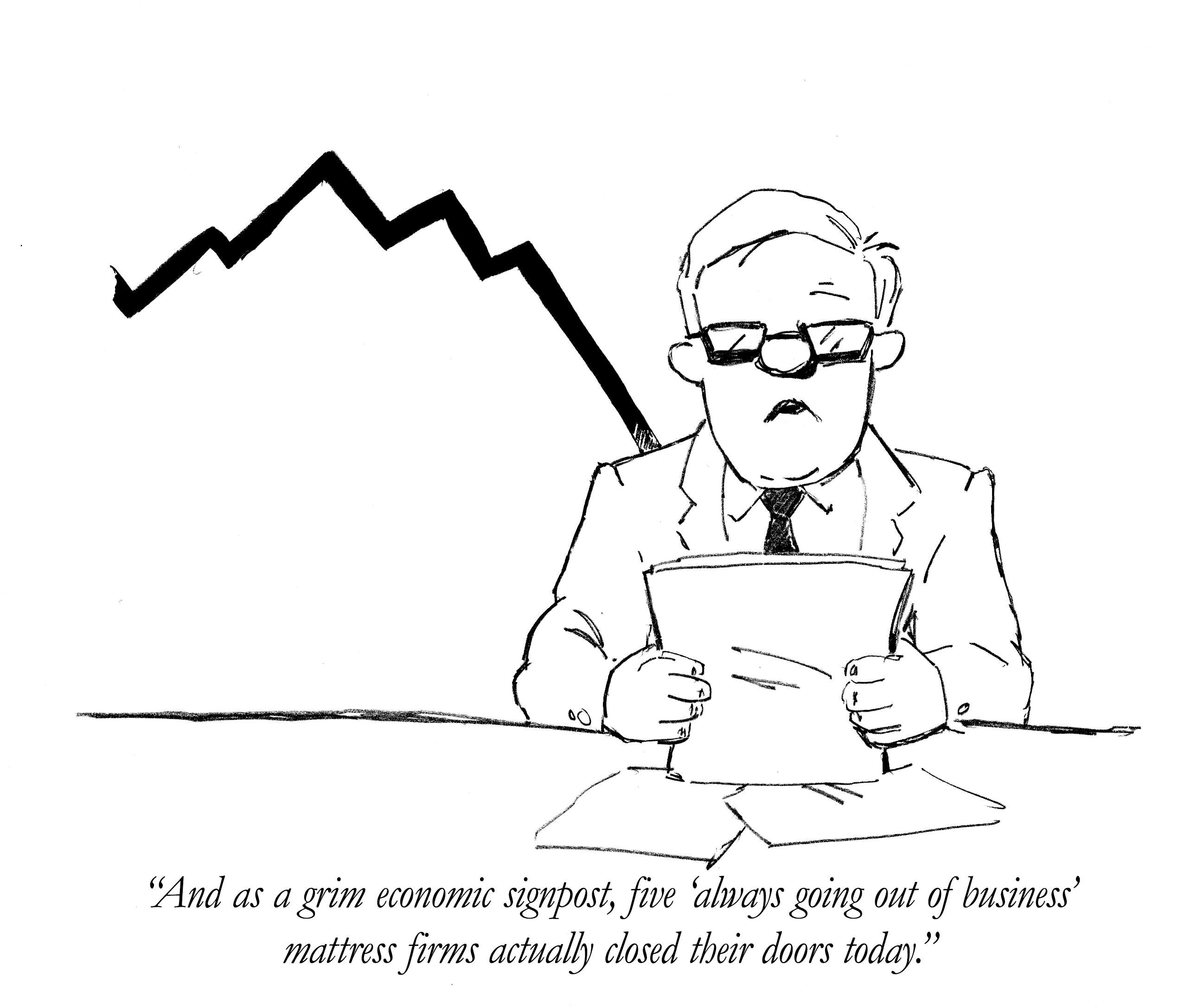In many controversies surrounding church teachings and policy, we are encouraged to spend more time in empathetic listening. This phrase empathetic listening has two components, the first being empathy—an attempt to relate to something another person is feeling—and the second being listening: actively seeking and receiving new information from another person. We suggest that the two dimensions of empathy and information are critical for understanding why so many of our conversations in and out of the Church result in so much contention and rarely increase understanding. We propose that attention to differences in these areas can be a way to short-circuit our tendencies toward contention and cause people to talk past each other.
Perhaps the most urgent examples for us to consider are discussions around church policy and teachings regarding sexual minorities and trans-identifying individuals. If we were to visualize the nature of church members’ stances on these questions, we might use a chart with axes of knowledge and empathy:
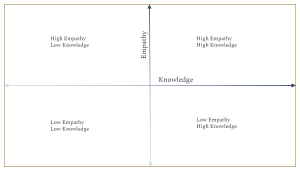
Looking at this chart, consider two hypothetical examples:
1. Mike is a parent whose young son, Eric, confided in him that he is attracted to other boys. Mike has never spent any time seriously investigating the nature of same-sex attraction, but he loves his son and suddenly feels a deep sense of compassion for other kids experiencing things similar to what Eric is experiencing.
2. Gary is a parent whose young son, John, confided in him that he is attracted to other boys. In response, Gary has been consuming hundreds of hours of podcast content, books, and social media posts where people discuss their experience of being a gay Latter-day Saint.
Our initial assessment would likely place both Mike and Gary into the high empathy quadrants, where Mike would be considered low knowledge, and due to Gary’s intensive consumption of information, Gary would be considered high knowledge.
However, this would be an erroneous understanding of Gary’s situation.
It is important to clarify that information is a narrative we create to explain certain selected data, and narratives are not the same thing as knowledge. In some of our presentations, we have discussed the process of moving from data to information to knowledge to wisdom and how that process involves patient effort.
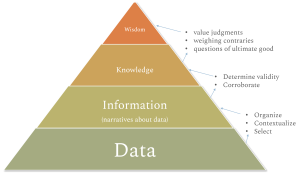
This model is often used in defense and intelligence contexts; a good example of how it works is found in Israel’s experience of the Yom Kippur War in 1973 and, more recently, in the October 2023 Hamas terror attacks on Israel. In both situations, Israel’s citizens and intelligence agencies had turned data (observations) into information (narratives) that did not reflect reality. Surprised by attacks from hostile neighbors in both instances, Israel has expended effort to understand where there was an intelligence failure, which is a breakdown that occurs somewhere in a defense organization’s process of moving from data to knowledge, which can then be developed into wisdom for making good choices. More broadly speaking, anytime we are surprised and feel blindsided by the actions of individuals or organizations, it means that we have been operating with a discrepancy between their adherence to this process versus ours.
To minimize the likelihood of an intelligence failure, intelligence analysts actively seek out disconfirming information—information that reflects a different narrative of data. When done sincerely, this helps to test the validity of narratives and jettison narratives that reflect poor assumptions.
Understanding Information, Narratives, and Knowledge
Returning to our hypothetical examples, Gary’s information-gathering will probably lead him to believe that he is knowledgeable about same-sex attraction and the experience of sexual minorities in the Church. After all, he has been hearing from countless people who are directly living that experience. He has likely internalized the dominant cultural narratives, such as that sexual minorities are only ever “born that way”; that same-sex attraction can never broaden into opposite-sex attraction; that not to immediately affirm an identity is to inflict lasting emotional and psychological trauma; that there is not a place for them in God’s plan of salvation; that their only two options are to accept exile from their faith or endure the inevitable misery and loneliness of celibacy; that so-called mixed-orientation marriages are inauthentic and doomed to failure, and more. Validation-oriented media keep their audiences stuck.
What happens when one has striven long and hard to develop a working view of the world, a seemingly useful, workable map, and then is confronted with new information suggesting that that view is wrong and the map needs to be largely redrawn? The painful effort required seems frightening, almost overwhelming. What we do more often than not, and usually unconsciously, is to ignore the new information. Often this act of ignoring is much more than passive. We may denounce the new information as false, dangerous, heretical, the work of the devil. We may actually crusade against it, and even attempt to manipulate the world so as to make it conform to our view of reality. Rather than try to change the map, an individual may try to destroy the new reality. Sadly, such a person may expend much more energy ultimately in defending an outmoded view of the world than would have been required to revise and correct it in the first place.
A good example of Peck’s notion of map revision is found in the story of Michelle Alleva, a formerly trans-identifying woman who detransitioned and turned to speaking out publicly about the effect of trans ideology on girls who are having normal adolescent experiences of social awkwardness. In a substack post describing her shift in narrative (or “map revision”), she depicted her trans-identifying narrative in the following way:
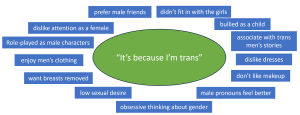
As time went on, Michelle developed new and more accurate understandings of her own psyche and found the courage to revise her narrative of her experiences in a map that reflects much more maturity and openness:
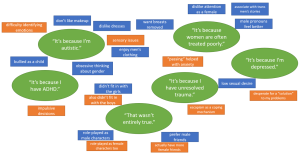
The great psychologist Carl Jung promoted this process of developing consciousness, of coming to understand the deeper things that are going on in our hearts and minds that shape our narratives and behaviors. He called it “individuation,” and to indicate how personally painful it can be, he used the metaphor of “crucifixion of the ego.”
As Peck noted, often new information is dismissed as “false, dangerous, heretical, the work of the devil.” And to be clear, sometimes it really is all of those things. But Michelle’s new narrative was of her own self-understanding, and she documented the fact that in many online communities, just this simple act of publicly questioning any element of one’s narrative of trans identity results in severe consequences of harassment, shaming, and emotional extortion. In an instant, what was once a supportive online community shows that they are somehow all out of empathy.
In popular podcasts that share the stories of sexual minorities and trans-identifying individuals in the Church, there are emotionally appealing personal narratives that are shared without any attempt to question their validity in any way. It is assumed that to interrogate a person’s personal narrative of their experience in the Church is to inflict “harm” and, even worse, to be a sign that one has a crippling character defect of lacking Christ-like empathy. This narrative reflects a preference for emotional validation over the development of knowledge and is a consequence of the cultural erosion of valuing objective truth as an important principle. Again in the words of M. Scott Peck, “Truth or reality is avoided when it is painful.” Nowadays, culturally protected classes have an effective veto on what narratives can be interrogated and which ones become sacred beyond questioning. And just like Israel’s intelligence failures, this creates a dangerous mismatch in knowledge that enemies can exploit. Are we mistaking narratives for knowledge?
Toward High Empathy, High Knowledge
Recalling our hypothetical church members Mike and Gary—if they are stuck in the zone of high empathy and low knowledge, what does it look like to fit into the other quadrants?
A low-empathy, high-knowledge individual might be very current in his understanding of all the latest research into human sexuality and the psychology of gender but also view these questions only in the abstract, like a science project. This individual may lack the ability to see beyond the theoretical and perceive real people with real stories and real day-to-day challenges. He will be a poor minister to those whose suffering is profound and real. This person probably is doing active harm in whatever domain his knowledge exceeds his empathy.
A low-empathy, low-knowledge individual couples a disdain or indifference toward other people with a lack of curiosity and an unwillingness to learn anything new. A good example of this quadrant is found in the narratives of people who dismiss sexual minorities as all having developed attractions as a result of sexual abuse or that all trans-identified individuals are just men with sexual fetishes. Choices in this zone are oriented toward the avoidance of intellectual and emotional work.
Finally, the quadrant of high empathy, high knowledge is occupied by the Church’s First Presidency and Quorum of the Twelve Apostles. Elder Jeffrey R. Holland spoke of the thoroughness of their efforts to gain knowledge for church governance:
Not often, but over the years, some sources have suggested that the Brethren are out of touch in their declarations, that they don’t know the issues, that some of their policies and practices are out-of-date, not relevant to our times.
As the least of those who have been sustained by you to witness the guidance of this Church firsthand, I say with all the fervor of my soul that never in my personal or professional life have I ever associated with any group who are so in touch, who know so profoundly the issues facing us, who look so deeply into the old, stay so open to the new, and weigh so carefully, thoughtfully, and prayerfully everything in between. I testify that the grasp this body of men and women have of moral and societal issues exceeds that of any think tank or brain trust of comparable endeavor of which I know anywhere on the earth.
These phrases looking so deeply into the old, and staying so open to the new, convey serious and mature engagement with disconfirming information that allows for movement from information (narratives) to knowledge (confirmed facts). Elder Holland would later say of their knowledge-seeking in questions surrounding sexual minorities, “I and many of my Brethren have spent more time and shed more tears on this subject than we could ever adequately convey to you this morning, or any morning.”
Their knowledge of these issues is coupled with profound empathy, as President Nelson expressed in a talk at BYU and, as Jeff described so powerfully, speaking from personal experience. Jeff can also confirm from personal experience that despite criticisms from both sides of the cultural divide on church policy and past statements from church leaders (some of which may be legitimately unfortunate), those high councils of the Church, including the Quorums of the Seventy, are indeed both highly informed and highly empathetic. This does not mean that the church organization always gets everything right or implements guidance correctly (especially at the local level), but it does mean that the level of knowledge and genuine concern for the individuals affected is greater than any other individual or organization of which we are aware. As the Psalmist says of the Lord, “mercy and truth are met together” (Ps 85:10), so His authorized servants seek earnestly to emulate this quality in their public pronouncements and policies as well as their personal ministry.
It’s important to understand that people whose commitments put them outside of the quadrant of high empathy and high knowledge will always have a hard time understanding the actions of the prophets and apostles who guide the Church. Some of them, lacking even a basic commitment to reality, will dismiss even the most obvious and easily verifiable information confirming the Church’s teachings on gender, sexuality, and family. They will label higher-knowledge skeptics of queer theory, gender theory, and other ideologies as “bigots” and “-phobes,” labels that reflect low knowledge (and usually epistemic closure) on the part of the labeler. At times, they will go so far as to engage in apologetics for depravity and neurosis while voicing an expectation that someday, high-knowledge church leaders will somehow “come around” to narratives that disregard knowledge in service to misplaced empathy.
In therapy, these pitfalls are known as client-therapist fusion and a lack of differentiation. When a therapist is fused with her client, her client’s suffering has fused with her own discomfort at that suffering. Now both must be eliminated at any cost, and she takes that suffering home with her. Pity and incapacitating affirmation replace acceptance and empowering resilience in therapy. This fusion reduces her capacity for handling painful emotions, which then likely gets imparted onto her clients. Both the therapist and the client are rendered less healthy in the course of this untherapeutic “therapy.” As psychotherapist Russ Harris writes, “Having the thought ‘I shouldn’t make my clients feel uncomfortable’ may lead [the therapist to avoid] the anxiety that comes with confronting problematic behavior in clients.”
You are the best therapist, he continues, “when you defuse from your own unhelpful thoughts, make room for [your and your client’s] discomfort, act in line with your values, and engage fully with the client.” The undifferentiated, fused therapist is a rescuer with all the frantic heedlessness and co-dependence that implies, whereas a differentiated, compassionately detached therapist is a healer who knows when and how much a dose of painful reality should be applied. She is compassionate without enabling dysfunction. She is able to do this because she has done this work within herself and exemplifies to her clients a courageous, continuing willingness to incorporate more and more reality and truth into her life.
Any of us can fall into the same fusion-undifferentiation trap, and that brings us to a point of reflection: where are we on this chart, and why? Are there data we are unwilling to see? Are we mistaking narratives for knowledge? Has our empathy closed us off to knowledge, or vice versa? And what about the people around us? How do we differ in our applications of these processes? How do those differences affect our ability to hold meaningful and productive conversations with each other?
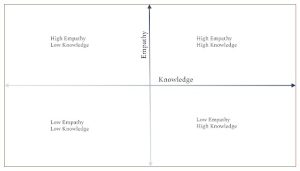
A year ago, when we created our series on sexual minorities in the Church and our series on the Family Proclamation, we did so with the intention of helping more church members join church leaders in the quadrant of high empathy, high knowledge. But that is a difficult place to be; it is a place that sees differences between narratives and knowledge. It is a place where people wrestle with ambiguity and sometimes struggle to navigate real dilemmas that stretch the soul. It is a place that is sometimes a target of attack, derision, and condemnation. But it is the only zone of experience where the decisions of our prophets and apostles become comprehensible. Best of all, it is the only hope the rest of us have of arriving at life-giving, life-saving truth, no matter how flawed and incomplete that will be for us mortals who “see through a glass darkly” (1 Cor 13:12). As Jesus promised to those with such courage, “ye shall know the truth, and the truth shall make you free” (John 8:32).













